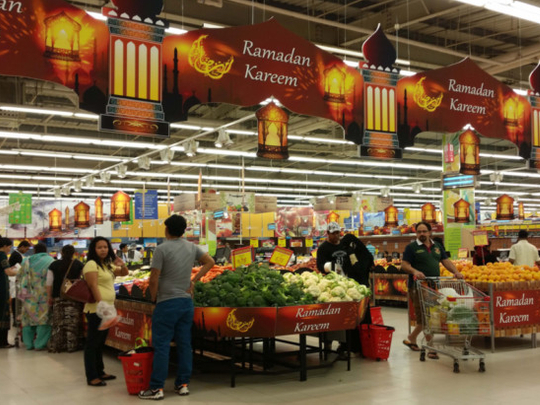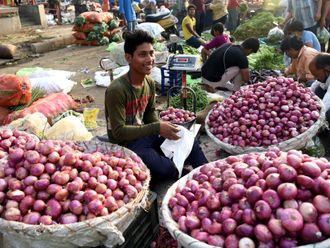
Dubai: Food prices in the UAE are running fairly stable despite the shocks thrown up by the still uncertain Red Sea situation, with local traders and retailers saying that consumer prices across food categories should remain at current levels during Ramadan.
As for shoppers, that would be the best outcome possible.
By bringing forward their next round of orders and confirmed shipment deliveries, local traders say they were able to lock in prices within range and that these would be reaching local ports well ahead of Ramadan’s start in second week of March.
As Dubai hosts the latest Gulfood trade show this week, relative price stability for food staples – and how to keep it that way - will remain the major talking point.
“Whether it’s wheat, rice or most other staples, the prices are holding steady, with wheat at $350 a tonne and Basmati around $950-$1,000 or over range (freight on board),” said Harish Tahiliani, Managing Director of Arab India Spices.
The same feedback is being received from retailers as well – the bottom-line being food prices are steady. If at all the Red Sea crisis has had an impact, it’s mostly limited to niche products sourced from Europe specifically.
According to Kishore Bhatia, General Manager – Commerce at the Dubai-headquartered supermarket operator T Choithram and Sons, “We benefit from a diversified network of suppliers and we're – therefore - better equipped to navigate unforeseen challenges and maintain continuity in distribution efforts.
“Agility is key. You have to take swift and decisive action to address the situation, whether it involves alternative suppliers, re-routing shipments, or adjusting our inventory management strategies. This minimizes any adverse effects on our operations.”
Lessons from last 2 years
By now, everyone in the food trade and retail sector, as well as those in the F&B space, have learnt the value of keeping all options open. Covid years disruptions upended the entire global shipping and logistics industry, which set off a food price inflation worldwide. And then came the start of the conflict between Russia-Ukraine on February 24, 2022, which created its own uncertainties, not least for wheat supplies from the Black Sea ports.
“Food inflation was a constant issue in 2021-22, and it was only second-half 2023 that saw the cooling off start to happen,” said a supplier. “Even with the Red Sea crisis going on, thankfully, at least food prices have remained fairly stable.”

The best part is that wheat prices are holding rock steady, at $350 a tonne, while some varieties of rice actually saw a price drop. Bodes well ahead of March's Ramadan buying
India export bans
In May 2022, India imposed export bans on all wheat from the country, done to ensure the domestic market had sufficient supplies and that price increases were kept to within limits. And then in July 2023, the export ban was extended to non-Basmati rice too. India has been the biggest supplier of both to the UAE and Gulf markets.
Buy from all possible supply sources
For wheat, local food businesses have been importing more from Australia, Russia, Ukraine and other sources to compensate for Indian supplies. Wherever there is a shortage in supply on any commodity, these businesses have managed to pick up the shortfall fairly easily.

The incidents in the Red Sea highlighted the vulnerability of supply chains, particularly for perishable or irreplaceable goods
Situation on Indian Basmati
“The Indian government's policy interventions - the ban on non-Basmati white rice exports, a 20 per cent duty on parboiled rice exports, and minimum export price of Rs950 per tonnes for Basmati, are expected to continue impacting the market,” said Dr. Dhananjay Datar, Managing Director at Al Adil Trading.
“Despite global ramifications and multi-year high prices, indications are these restrictions will persist at least until the first-half of 2024.
“Demand for India Basmati rice may face challenges due to higher logistics costs and the minimum export price. Despite shipping disruptions in the Red Sea, exporters believe that Basmati exports will adjust to the new reality without significant disruptions.”

Shipping service suspensions and blank sailings are expected to impact India’s exporters, particularly during the pre-Chinese New Year rush. With India’s exports peaking in January-March quarter, the situation may lead to increased demand and pressure on East-West trade routes
Post-election change?
Other industry sources suggest the likely timeline for India to walk back its export bans would be after the general elections due by May. "The status quo on export bans will definitely continue until election time," said a trader. "Once the results are out, the India government will have more flexibility.
"Because rice exporters in India have been sounding out their concerns that they are losing market share to other suppliers because of the minimum export price of Rs950, even though it was dropped from Rs1,200 a tonne earlier."
"Seafood availability has been particularly affected. However, restaurants are unable to pass these increased costs onto consumers, impacting sales. Revenue in the first quarter of 2024 has dropped by over 25% compared to 2023, highlighting the significant impact of these challenges on businesses in the region."
- Shanavas Mohammed of Golden Fork restaurant chain












